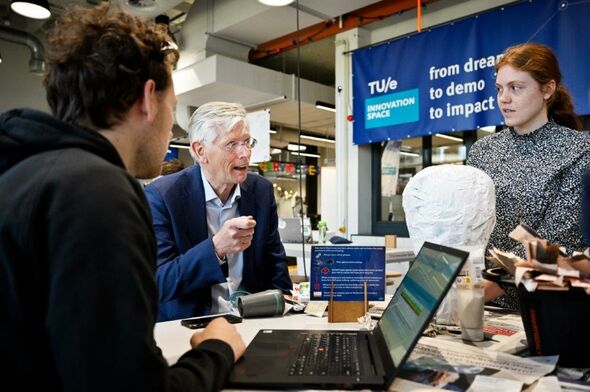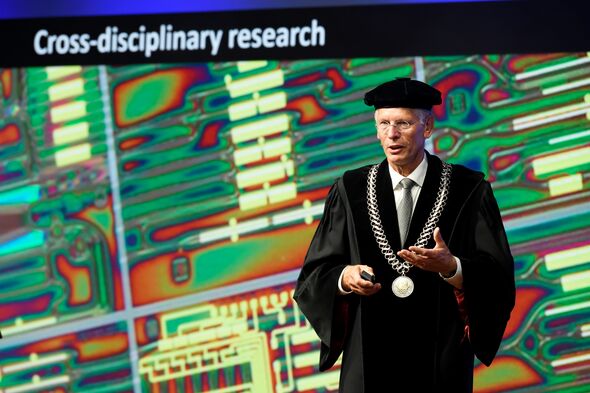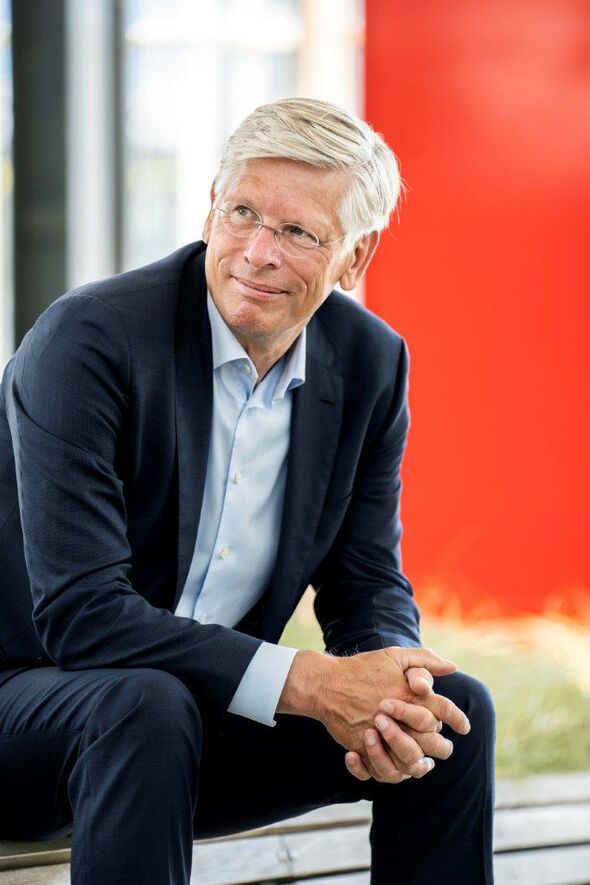
“Think carefully about what you want to excel at”
Frank Baaijens reflects on eight years of rectorship
This week, on Thursday May 11th to be exact, rector Frank Baaijens will place his chain of office on the shoulders of his successor, Silvia Lenaerts. On the Executive Board he was responsible for education and research at TU/e. As he leaves his current office but not, mind you, TU/e, we first put to him six questions raised by students (submitted to us on Insta), and we look back with him at some of the issues that arose during his eight-year term as rector. A farewell interview about getting to know one another, the corona crisis, Mindlab, the University Council, and much, much more.
While you've been rector, do you feel like you've gotten to know students personally?
“I'd say so, yes. But not all 14 thousand of course. One of the things I've done from the start is my annual tour of the campus, visiting every program. ESA and a commissioner of the relevant study association would drum up a group of about eight students. Taking various statements, I'd discuss the arguments for and against with them. I really enjoyed these roundtable discussions. Students are very open and don't have a political agenda. One of the things I heard, for example, was that when they were launched in 2012, the USE Learning Trajectories weren't dovetailing well with the majors. This was later improved.”
What can and should TU/e do to ensure that its education is not just good but world-beating?
“It's all about attracting the right people. That's what determines the quality of the education you're offering. Then, you have to think carefully about which fields you want to excel in. The four institutes are TU/e's choice made manifest. And speaking of excellence, I think the fact that our top academics are still giving lectures to our bachelor students is one of this university's huge strengths. And it's something our academics also feel is important. I'd also say that the quality of the education offered here is being improved by the Rewards and Recognition program.
Having said all that, it's going to be difficult to become the best in the world because we have to work with a less favorable student-staff ratio than other elite institutions. MIT in Boston, for example, has ten students per staff member; at TU/e the ratio is 20:1. The degree of personal attention we can give isn't comparable.”
I think the fact that our top academics are still giving lectures to our bachelor students is one of this university's huge strengths.
Can you give us more details about the university's contract research funding?
“Contract research funding is a very broad concept. All the university's European funding as well as its funding received from the Dutch health sector falls into this category. Only a small portion - I can't tell you the percentage off-hand - comes directly from companies. The university has a very good collaborative relationship with industry - one source of our direct funding is ASML - but more commonly, the funding provided by companies finds its way into government programs, like the European Horizon Program.
You should be aware, however, that the decision whether or not to participate in any given research program is ours to make. Where the fossil fuel industry is concerned, we've said that we'll only work on topics related to sustainability. Although this would have been our position even without Extinction Rebellion, the occupation certainly raised everyone's awareness.”
Do you think the Mindlab performances put on for employees last year at TU/e and the Time Out performances for students influenced things at TU/e?
“They certainly had an impact. It's a difficult thing to measure, but a lot of people saw the shows and afterwards a great many groups came together and started discussing the theme. The key thing is whether people then change their behavior and are quicker to raise the alarm when they see abuse happening, even if it's a minor infringement. Speak up! It'll help improve everyone's feeling of social safety.
We ran a survey and it showed that no less than 90 percent of our PhD candidates are satisfied at TU/e. A literature study indicated that nationally this satisfaction percentage stands at sixty. So we aren't doing a bad job at all.”
What have you most regretted during your term as rector?
“I've certainly wondered whether - in hindsight - I should have done something differently than I did, but nothing comes to mind. Although I devoted a great deal of time to communication, perhaps, after all, it wasn't enough. So I'd have to say that, despite everything, communication has been the most difficult thing.
Two processes I enjoyed were creating our Strategy 2030 and setting up the Rewards and Recognition program, particularly for the roundtable discussions with employees they involved. These were valuable sessions.”
What‘s up next for you, sir?
“First off, I'm taking a sabbatical, going to Harvard, back to where I was ten years ago. It's only for a short period and once the Dutch school vacation starts, my wife, Carlijn Bouten, and daughter Elle, will join me there. I want to see what the interaction is like there between medical technology and the medical sector. That'll be my main aim while I'm at Harvard, because TU/e is keen to develop its collaboration with Catharina Hospital and the Máxima Medical Center.
After that I'll be going back to my department, Biomedical Engineering. Back to working in regenerative medicine.”
You should be aware, however, that the decision whether or not to participate in any given research program is ours to make.
Has the University Council ever changed your mind about something?
“What a lot of people tend to forget, I think, is that the things we discuss in University Council meetings have all been prepared well ahead of time by a great many people on all kinds of committees. What's more, the Executive Board often holds informal sessions with University Council members at which we exchange ideas. It could be that new information comes to light at one of these sessions, prompting me to think that we should take a slightly different direction. But I don't have a concrete example for you of changing my mind.”
Looking back at corona crisis, is there anything you'd have liked to have done differently?
“At the time, my first thought was that we'd have to weather the crisis until the new academic year in September (the switch from campus-based to online teaching was made early, on March 23rd, 2020, ed.). But when I got hold of the scientific models, I understood that this wasn't going to blow over anytime soon. We were one of the first universities to close our doors. That was the correct decision. We didn't do anything crazy; on the contrary, we were always looking for responsible ways to give our research and our students more room to maneuver. For example, that was when we placed more yellow picnic tables outdoors. Looking back at that time, by managing to put its education online so quickly, I'd say that TU/e as a whole performed impressively.”
Back in 2019 did you expect the opposition the Irène Curie Fellowship program met with in some quarters, including the Netherlands Institute for Human Rights, and it is conceivable that a similar program for people of color might be introduced at TU/e at some future date?
“I did expect this measure - to accept only applications from women during the first six months after a vacancy posting - to cause a stir, but not that the commotion would become international. I thought the story would be picked up by Cursor, and then we'd be called up by the Eindhovens Dagblad, but it went viral. Even people I know at Harvard were asking me for an explanation.
But I wouldn't hesitate to do the same thing again; it works. Fifty percent of our new academic hires are now women. Among them are a good number of internationals, so indirectly we're also seeing an increase in diversity in terms of culture and color. A special program isn't necessary.”
How realistic is it to think that The Hague will help fund the leap in scale?
“With politics you just never know, haha. At the end of the day it's a political choice. It would be wise to invest in a university of technology, especially one located here in Brainport. If the money comes later, it'll delay growth. This has the knock-on effect of delaying the Netherlands' economic development, so it's damaging. It means industry has to wait longer before it can source employees from abroad.
Neither, let it be said, are we managing to find enough students here in the Netherlands. This is another issue the government needs to take action to address. If companies realize they can't find any employees here, they may well go elsewhere.”
What do you think of the revitalized Bachelor College, to be launched this coming September?
“We asked lecturers what they thought worked well and less well in the BC. To put it bluntly, this revealed two things: the basic courses were not dovetailing well with the majors, and neither were the USE Learning Trajectories. Using basic courses as a way to create a common basis makes sense, but getting two thousand students to embrace the idea proved too difficult.
As a result, two things are changing. Firstly, lecturers have now been put more firmly in the driving seat; they will have more personal responsibility and I'm confident this will boost enthusiasm. Secondly, challenge-based learning is now an important part of the curriculum across all programs. Here, too, we are relying on the quality of our lecturers. One feature we are certainly not diminishing in BC 2.0 is the freedom of choice students have. For forty-five of the 180 credits it's up to them what they study.”
In the Bachelor College 2.0 lecturers will have more personal responsibility and I'm confident this will boost enthusiasm.
Finally, do you have any tips for Silvia Lenaerts, your successor as of May 11th?
“Above all, she needs to put her own stamp on the job, and stay focused on what she wants to achieve. She also needs to develop a good relationship with her fellow administrators, and that includes the deans. After all, you're not on your own out there, you've got them. Be sure to talk to everyone, that's how you find out the issues on people's minds. A really good way of doing this is those roundtable discussions we mentioned at the start of the interview.”




Discussion